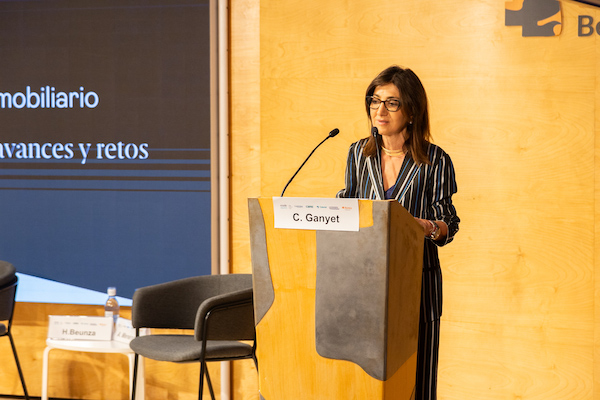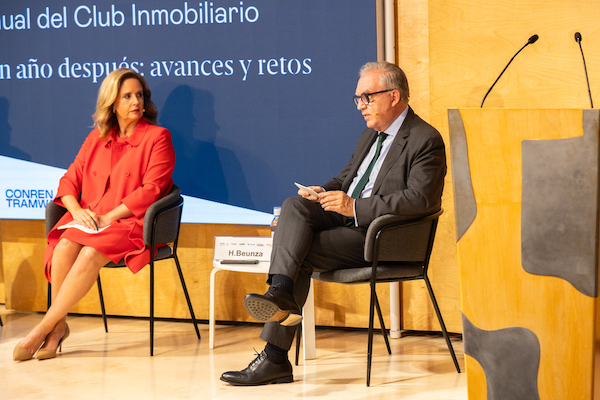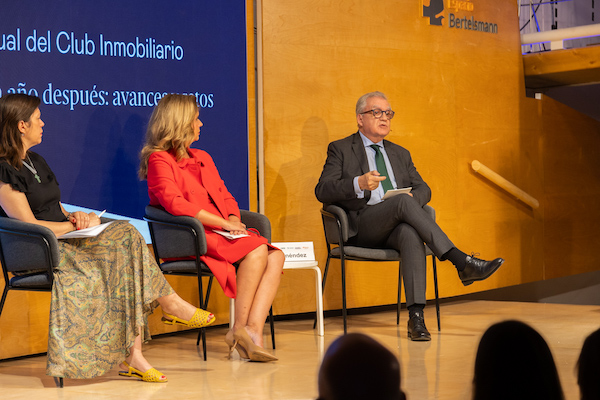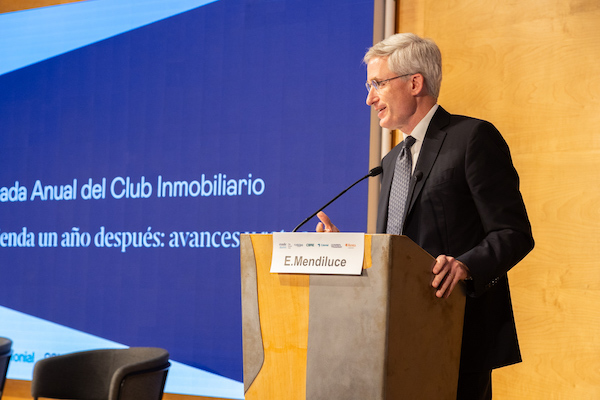Representatives from the government and the private real-estate sector concurred on the need to team up in order to achieve greater efficacy in the management that guarantees access to housing, with a focus on rentals.

Yet another year, the Esade Alumni Real Estate Club has held its customary Annual Conference entitled “Housing Act one year later: Progress and challenges.” One year after the approval of the Housing Act, the challenge still looms quite large. The consensus on the need to increase the housing supply should take shape in public and private initiatives, and thus the conference sought to outline initiatives with the leading stakeholders in the sector.
Carmina Ganyet (VV 03), President of the Esade Alumni Real Estate Club and Corporate Director General of Colonial, said during the introduction that the club has held many conferences to talk about housing, always in a constructive, collaborative way in an attempt to help solve the housing problem in Spain. “This year, we celebrate the fact that prestigious institutions like the IMF, the Bank of Spain, BBVA, and the Círculo de Economía have spearheaded initiatives like the ones we in the Real Estate Club have long been calling for. We are satisfied with the reflections made and believe that if more voices chime in, we’ll reach a solution.”

Carmina Ganyet applauded the approval of a Housing Act that aims to “lay the groundwork to guarantee access to decent housing,” but she underscored the fact that the law “may overburden the private sector, and there are measures that are not going to achieve equity but may actually have the opposite effect.” She also stated that there are no “miracle or short-term solutions” to the housing problem; instead, what is needed is “ambition because it is a deep-seated, long-term problem.”
Next, Íñigo Fernández de la Mesa, Chairman of the Board of Rothschild & Co Spain and vice-president of CEOE, made a presentation on the international economic climate and the US, Chinese, Japanese, and European economies, and after discussing Europe he focused in on Spain.
In real estate, the confidence indicators in construction for this year are very high, but this is not taking shape in the reactivation of the industry; instead, it is expected to reactivate next year. “The number of permits hasn’t risen yet, but private consumption may turn around thanks to the lower interest rates and savings. There is a need to build new homes to cover the pent-up demand, so public spending and regaining the levels from 15 years ago are essential factors.”

Fernández de Mesa believes that the Housing Act has some flaws, such as the 30% set aside for publicly-subsidized housing, which makes development not very profitable. He added that social rentals, which the rest of Europe has focused on, should be developed by the public sector, although the private sector should also be involved.
Panel discussion
The conference included a panel discussion moderated by Ruth Ugalde, economy correspondent at El Confidencial, with Anselmo Menéndez, deputy director general of housing policy and assistance at the Ministry of Housing and Urban Agenda; Gregorio Izquierdo, director general of the Institute of Economic Studies; and Helena Beunza, president of ASVAL. In their analysis, they agreed that measures should be promoted to expand the housing supply through agreements between the public sector and private operators with the goal of rectifying the shortage in the supply.

Carlos Ruiz: «The new act does not meet the current needs. The supply has to be promoted, and public-private cooperation is needed to promote access among vulnerable groups».
 Helena Beunza: «We don’t have a housing stock with affordable rentals, unlike other countries. This fundamental leg is missing. The ICO’s endorsements are positive, but this public-housing stock has to be created».
Helena Beunza: «We don’t have a housing stock with affordable rentals, unlike other countries. This fundamental leg is missing. The ICO’s endorsements are positive, but this public-housing stock has to be created».

Anselmo Menéndez: «We hope that the Land Law is approved so that there is more land with legal guarantees and efficient management, but all these problems can’t be solved overnight».
To conclude the event, Eduard Mendiluce (MBA 87), CEO of Anticipa and Aliseda, summarized the main conclusions of the conference by stating that the problem is a lack not of ideas but of implementation. Mendiluce defended the mobilization of private land to develop social housing as a way to solve the deficit of this type of housing in Spain and accessibility issues among the most disadvantaged sectors. Mendiluce proposed a private land grant program with concessions for the state to use the land for 75 years as a way to enlarge the stock of social and affordable housing. He also defended agreements between private operators and the public sector to mobilize existing properties through 25-year leases with public guarantees..






 Helena Beunza: «We don’t have a housing stock with affordable rentals, unlike other countries. This fundamental leg is missing. The ICO’s endorsements are positive, but this public-housing stock has to be created».
Helena Beunza: «We don’t have a housing stock with affordable rentals, unlike other countries. This fundamental leg is missing. The ICO’s endorsements are positive, but this public-housing stock has to be created».

































